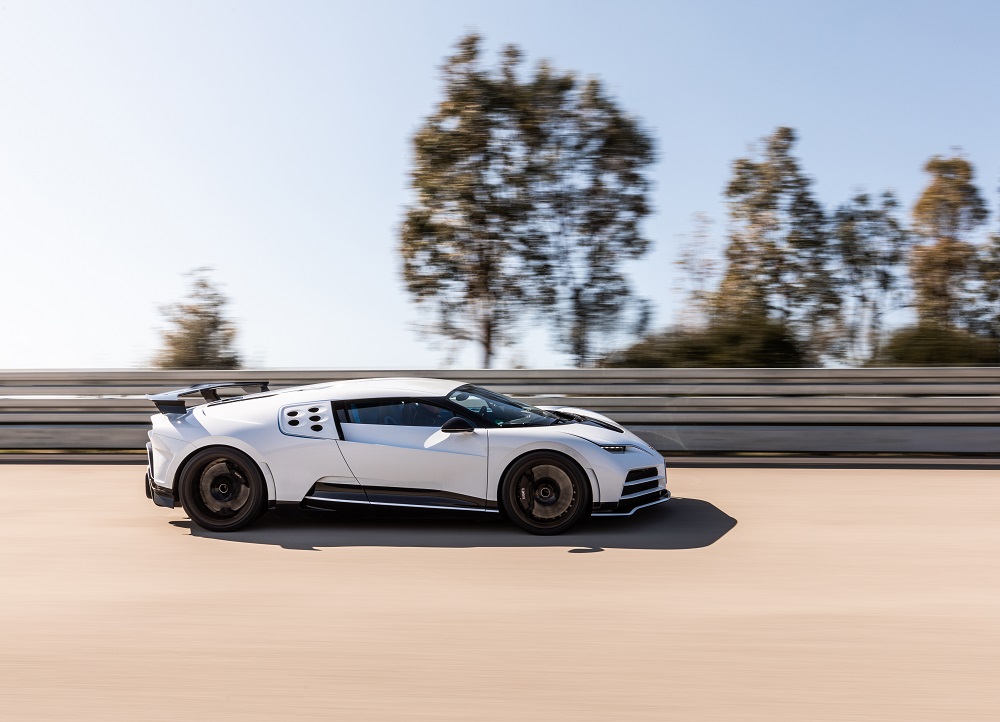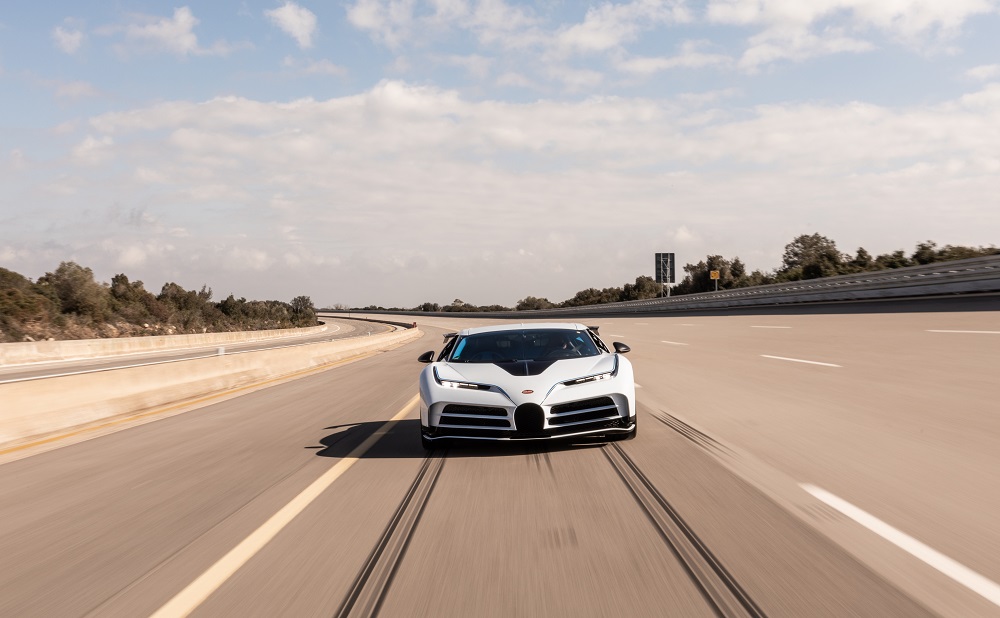Just ten Bugatti Centodieci cars will be built, yet the French luxury car manufacturer is putting the very same energy into developing and testing them as it devotes to its 'series products', such as the Bugatti Chiron. Bugatti's customers expect nothing less. After all, coach built models are the most exclusive the brand has to offer, with limited production units and extraordinary design featuring individual dynamic setups.
Over the course of many months, Bugatti test drivers and engineers gather technical data and gain valuable experience at high-speed, on handling routes and circuits, on highways and in city traffic - all of which is shared with the technical development department at Bugatti Engineering for meticulous evaluation. The production-based prototype of the Centodieci completed over 50,000 test km in total upon its return from Nardò in the Puglia region of southern Italy, following final endurance testing.
The white prototype completes lap by lap for hour after hour, km after km. Three drivers rotate to examine all functions of the Centodieci, registering and logging every minor anomaly. They drive day and night on different track profiles and across every speed range, from stop-and-go pace to top speed. Endurance testing requires drivers to possess outstanding technical knowledge, maximum concentration, and sensitivity, as well as precise mastery of the vehicle. Even after hours on the high-speed track, they must be able to perceive the slightest of atypical noises, movements, and irregularities. Everything is inspected one final time: driving on different surfaces - both wet and dry - testing every little steering movement, braking, acceleration, cornering load, and functionality of the driver assistance systems.
“With its high-speed circuit and handling course, the Nardò test center provides the ideal conditions for intensive endurance tests,” says Steffen Leicht - the man responsible for endurance testing at Bugatti. The 12.6-km-long circular track with a diameter of four km is considered the fastest automotive circuit in the world - perfect for the 380 km/h Centodieci. The 6.2 km-long handling course on the inner section permits checks at the highest load levels and with longitudinal and transverse dynamics. The over 70 hectare-large site at Nardò provides 70 km of roads with different surfaces, enabling extensive testing and inspection of all vehicle components.
The Centodieci covers up to 1,200 km each day, interrupted only by technical checks, refueling, and driver changes. Throughout the entire time, Bugatti’s engineers analyze the engine and vehicle data and make adjustments where necessary. “We assess every element on the vehicle one last time, paying particular attention to functionality and durability before the first Centodieci cars go into production,” explains Carl Heilenkötter - project manager responsible for one-off and few-off projects at Bugatti. All components must interact perfectly with one another and be capable of withstanding any kind of overloading. They must also harmonize in a stable and safe manner even when subjected to the most severe handling situations.
The white prototype completes lap by lap for hour after hour, km after km. Three drivers rotate to examine all functions of the Centodieci, registering and logging every minor anomaly. They drive day and night on different track profiles and across every speed range, from stop-and-go pace to top speed. Endurance testing requires drivers to possess outstanding technical knowledge, maximum concentration, and sensitivity, as well as precise mastery of the vehicle. Even after hours on the high-speed track, they must be able to perceive the slightest of atypical noises, movements, and irregularities. Everything is inspected one final time: driving on different surfaces - both wet and dry - testing every little steering movement, braking, acceleration, cornering load, and functionality of the driver assistance systems.
“With its high-speed circuit and handling course, the Nardò test center provides the ideal conditions for intensive endurance tests,” says Steffen Leicht - the man responsible for endurance testing at Bugatti. The 12.6-km-long circular track with a diameter of four km is considered the fastest automotive circuit in the world - perfect for the 380 km/h Centodieci. The 6.2 km-long handling course on the inner section permits checks at the highest load levels and with longitudinal and transverse dynamics. The over 70 hectare-large site at Nardò provides 70 km of roads with different surfaces, enabling extensive testing and inspection of all vehicle components.
The Centodieci covers up to 1,200 km each day, interrupted only by technical checks, refueling, and driver changes. Throughout the entire time, Bugatti’s engineers analyze the engine and vehicle data and make adjustments where necessary. “We assess every element on the vehicle one last time, paying particular attention to functionality and durability before the first Centodieci cars go into production,” explains Carl Heilenkötter - project manager responsible for one-off and few-off projects at Bugatti. All components must interact perfectly with one another and be capable of withstanding any kind of overloading. They must also harmonize in a stable and safe manner even when subjected to the most severe handling situations.
Bugatti has subjected its products to the highest quality standards for more than 100 years, and the marque continues to adhere to these standards up to this day. As such, the Centodieci will guarantee its owner a unique driving experience 100 years from now. To achieve this level of quality, Bugatti goes well beyond the legal and expected requirements.
As soon as the final assessment has been completed, the first of the highly exclusive vehicles - each with a starting price of eight million euros - enters into production. In the Molsheim Atelier, Alsace, the Centodieci will be built with the same diligence taken by the engineers during the development phase. All ten cars are set to be delivered to their owners this year.
As soon as the final assessment has been completed, the first of the highly exclusive vehicles - each with a starting price of eight million euros - enters into production. In the Molsheim Atelier, Alsace, the Centodieci will be built with the same diligence taken by the engineers during the development phase. All ten cars are set to be delivered to their owners this year.











